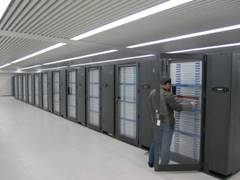
Il nuovo supercomputer Tianhe-1A, mostrato di recente presso l'HPC 2010 in Cina e in grado di far rilevare il nuovo record monidiale di performance, pari a 2.507 petaFLOPS (10^15 FLOPS, FLoating point OPerations per Second, 1.000.000.000.000.000 di calcoli in virgola mobile eseguiti nell'unità di tempo, ndr) con l'ausilio del benchmark LINPACK, utilizza anche componentistica NVIDIA, ed in particolare le gpu Tesla.
A rivelarlo è lo stesso chip maker statunitense, nell'ambito del seguente comunicato stampa: più in dettaglio, il supercomputer Tianhe-1A (cfr. la foto seguente), la cui architettura utilizza in maniera massiva e in parallelo chip di tipo CPU multi-core e GPU, include 7168 gpu NVIDIA Tesla e 14.336 cpu.
In accordo a NVIDIA, il ricorso alle gpu Tesla ha permesso il raggiungimento della soglia di 2.507 petaFLOPS con "soltanto" 14.336 processori; in assenza delle gpu, infatti, il numero di processori richiesto, per ottenere lo stesso livello prestazionale, sarebbe stato pari a 50.000; parimenti, con una architettura basata unicamente su CPU il consumo di potenza, attualmente di 4.04MW, sarebbe risultato pari a 12MW.

[Immagine ad alta risoluzione]

Tianhe-1A, a new supercomputer revealed today at HPC 2010 China, has set a new performance record of 2.507 petaflops, as measured by the LINPACK benchmark, making it the fastest system in China and in the world today(1).
Tianhe-1A epitomizes modern heterogeneous computing by coupling massively parallel GPUs with multi-core CPUs, enabling significant achievements in performance, size and power. The system uses 7,168 NVIDIA Tesla M2050 GPUs and 14,336 CPUs; it would require more than 50,000 CPUs and twice as much floor space to deliver the same performance using CPUs alone.
More importantly, a 2.507 petaflop system built entirely with CPUs would consume more than 12 megawatts. Thanks to the use of GPUs in a heterogeneous computing environment, Tianhe-1A consumes only 4.04 megawatts, making it 3 times more power efficient -- the difference in power consumption is enough to provide electricity to over 5000 homes for a year.
Tianhe-1A was designed by the National University of Defense Technology (NUDT) in China. The system is housed at National Supercomputer Center in Tianjin and is already fully operational.
"The performance and efficiency of Tianhe-1A was simply not possible without GPUs," said Guangming Liu, chief of National Supercomputer Center in Tianjin. "The scientific research that is now possible with a system of this scale is almost without limits; we could not be more pleased with the results."
The Tianhe-1A supercomputer will be operated as an open access system to use for large scale scientific computations.
"GPUs are redefining high performance computing," said Jen-Hsun Huang, president and CEO of NVIDIA. "With the Tianhe-1A, GPUs now power two of the top three fastest computers in the world today. These GPU supercomputers are essential tools for scientists looking to turbocharge their rate of discovery."
NVIDIA Tesla GPUs, based on the CUDA parallel computing architecture, are designed specifically for high performance computing (HPC) environments and deliver transformative performance increases across a wide range of HPC fields, including drug discovery, hurricane and tsunami modeling, cancer research, car design, even studying the formation of galaxies.
Source: NVIDIA Press Release
Links